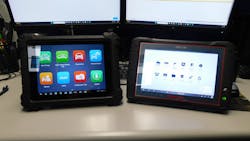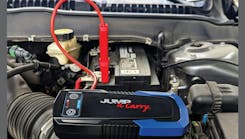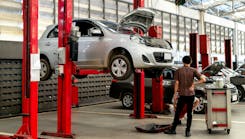Do you want to dive into the hybrid and EV repair market? Tools and equipment might not be as expensive as you think.
Being in the automotive repair industry now for 40 years, I would have to say I have accumulated quite the tool assortment, from basic tools to advanced-level diagnostic test equipment.
I have always looked at tool purchases as an investment in my career and a necessary evil to perform repairs or diagnoses effectively and efficiently. When we decided to enter the hybrid and electrified vehicle service and repair six years ago, I started doing my research on the equipment and training required, from basic to advanced.
The first step was finding quality training, I know this is not considered equipment, but training is an essential tool. Without training, I would have been just purchasing random equipment and tools without a solid knowledge of what would be required.
Our shop chose EVPRO+ exclusively as our primary training company due to their years of experience in the electrified vehicle industry. They provide hands-on, web-based, and certification training programs.
Working with EVPRO+, we have developed a “3 Tier” recommendation for equipment to service and repair hybrid and electrified vehicles. I will focus on “Tier 1”, which is what most repair shops will need to perform basic maintenance, service, and diagnostics.
It is strongly recommended that any technician who will be servicing a hybrid/electrified vehicle take a basic high-voltage electrical safety course before performing any type of service to a vehicle.
Tier 1
- Class “0” 1000V high voltage gloves with leather overs: These do need to be replaced or recertified every six months and inspected before use for any signs of damage or leaks. Along with eye protection and other related PPE as outlined in a safety course.
- Isolation meter: This needs to be a CAT III meter (along with the leads and clips/probes), rated at 1000V. This is used to verify the vehicle, component or circuit is “safe” (near zero volts) to perform repairs required and perform isolation fault testing. I use a Fluke 1587 FC but there are others available, just make sure it is CAT III rated.
- Diagnostic scan tool: Obviously to get diagnostic trouble codes and data, but it will also need to have bidirectional controls to assist in bleeding cooling systems.
These tools are primarily all that is required to do basic servicing and repairs. Tiers 2 and 3 start getting a little more costly and require proper training to perform the testing they support.
I strongly recommend before performing any type of service or repair you refer to the OEM service information sites for all procedures.
One more note, you may want to consider contacting EVPRO+ to get a vehicles in operation (VIO) report for your area, this will give you an idea of how many hybrid/electrified vehicles are in your area so you can make a logical decision on equipment and tool purchases, level of training, and services you will want to offer.
Remember, there are a lot of service opportunities on these vehicles. You must know what to look for and present the services required. Put the money in your pocket, not someone else’s.



